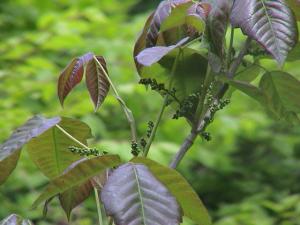|

|
|
|

|
|
Picture of the WeekWe welcome your pictures of poison ivy, oak, or sumac plants; and urushiol induced rashes. We'll be featuring a new picture every week. Here's this week's picture:
Jil Sinon sent in pictures of a lovely poison ivy plant among her perennial plants. Now that is a dashing bit of poison ivy! SEND US YOUR PICTURES! click here for the upload form. Especially needed right now are poison oak and poison sumac pictures. Is it Poison Ivy?We've been getting some great poison ivy, poison oak, and similar plant pictures. Many of the pictures come with the query "Is it Poison Ivy?". So, here we go with a new section with an attempt to answer that question. Click here for poison ivy, poison oak pictures as well as many imposters (look-alikes) and see what our viewers are finding in their backyards.SEND US YOUR PICTURES! click here for the upload form. Picture tip: getting a picture of the leaves and the stem / vine is helpful. You can upload multiple pictures so take what is needed to show the plant setting, leaves and any other useful information. There are a wide variety of "imposters" so all the additional info is helpful. OverviewThe compound leaves of poison ivy consist of three pointed leaflets; the middle leaflet has a much longer stalk than the two side ones. The leaflet edges can be smooth or toothed but are rarely lobed. The leaves vary greatly in size, from 8 to 55 mm (0.31" to 2.16") in length. They are reddish when they emerge in the spring, turn green during the summer, and become various shades of yellow, orange or red in the autumn.Below you will find links to pictures of poison ivy, oak, and sumac and a few of the links have quizzes for you to challenge your identification skills. Picture CollectionsPlease note that all pictures on this website are owned either by individual contributors or by Jim Dunphy. Please contact us via the feedback form if you would like to use these on a website, in print or other media or have access to high-resolution versions of the pictures.
Pictures & QuizPoison Ivy (Toxicodendron radicans)Poison Oak Pictures (Toxicodendron diversilobum)Poison Sumac Pictures (Toxicodendron vernix)Video ClipsThese are WMV (Windows Media) formatted clips Rash IdentificationContact dermatitis is a physiological reaction that occurs after skin comes in contact with certain substances. Unfortunately, we lump poison ivy, oak, and sumac as the cause of all dermatitis.
Plant dermatitis is caused by reaction to skin contact with certain plants.
Irritant dermatitis, the most common type of contact
dermatitis, involves inflammation resulting from contact with acids,
alkaline materials such as soaps and detergents, solvents, or other chemicals. The reaction usually resembles a burn. Examples of Rashes: Finally see this link and observe all the different contact dermatitis that was caused by everything but urushiol oil. Also, see the Rash Hall of Fame. |
| |
Home | Site Map | Feedback | © 1999 - 2024 by Jim Dunphy |